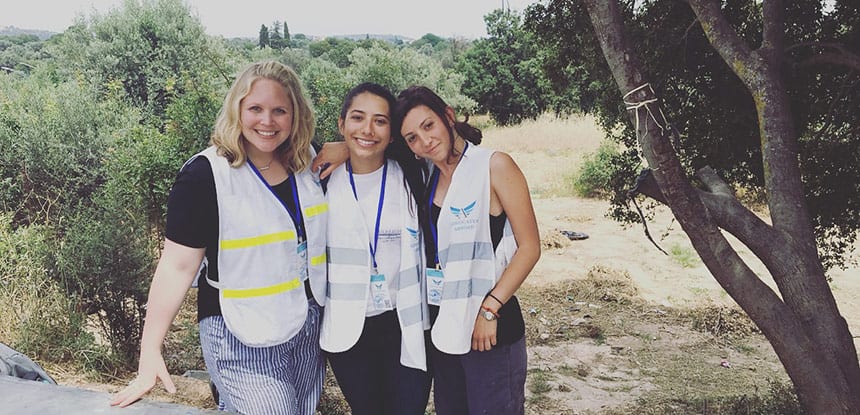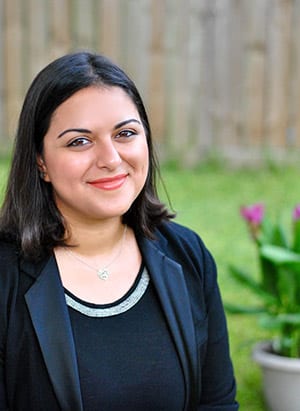
By Andrew Cohen
For many, the scope of dire human rights issues seem overwhelming and impossible to mend. While Human Rights Center student fellows harbor no delusions about the challenges at hand, they also bring fierce determination—and concrete strategy—to make a tangible difference.
Berkeley Law students Karin Bashir ’20 and Safa Ansari-Bayegon ’20 were among this year’s group of 17 fellows who at a recent center conference described their experiences helping various human rights organizations worldwide last summer. Since the fellowship program launched in 1994, more than 300 students from wide-ranging disciplines across the UC system have worked in 80 countries and territories.
Karin assisted Advocates Abroad, a nonprofit that provides legal services to refugees and asylum seekers in Greece. Working at the Vial refugee camp on the island of Chios, she led a project to create a digital, pocket-sized “legalese dictionary” in Arabic and Urdu for interpreters who assist refugees.
“I thought creating a legalese dictionary would be useful because translators on the ground can struggle with complicated legal terms used within the asylum process,” she says. “It has been an ongoing project, and I’m still developing the final product for the team.”
A translator before law school, Bashir confronted similar issues while working with refugees and migrants in Turkey and Bahrain. She says her experiences there “drove me to come to law school.”
In addition to translating for other volunteers, Bashir helped prepare refugees for their interviews and answered questions about the asylum process. She also collected data on sexual harassment experienced by women in the Vial camp to help determine particularly dangerous areas. Advocates Abroad used that information in workshops that advised women about the safest times of day to be in certain camp areas.
With only a few organizations offering legal assistance on the island, Bashir admits that trying to balance providing a high quantity of services while maintaining high-quality advocacy presented an ongoing challenge.
“It was clear how necessary and meaningful the work was to those we assisted every single day,” she says. “Though it wasn’t always easy to hear such difficult stories, you also had the opportunity to interact with brave, courageous, and inspiring people and actually have the chance to help them on their journey. It was incredible.”
Parole process

Ansari-Bayegan worked with the Atlanta-based Southern Center for Human Rights, a nonprofit law firm that works to end capital punishment, mass incarceration, and other criminal injustices that disproportionately affect poor people and people of color in the South.
She served as a direct advocate for an incarcerated individual in Alabama—and helped him gain parole. The work included interviewing her client, investigating potential sources of support for him, developing a post-release home plan, preparing an Application of Support on his behalf for the Alabama Parole Board, and advocating for his release at the parole hearing.
Ansari-Bayegan enjoyed “showcasing the work my client had done while incarcerated and the many ways he had prepared himself for success upon release. Although he wasn’t in the room when the decision was made, several of his family members were there to support him. Witnessing their relief and happiness was very powerful.”
Ansari-Bayegan also helped develop SCHR’s parole advocacy materials to help future advocates better serve parole clients. Noting that parole affords few due process protections, her summer research found little uniformity within parole processes across the United States.
“Incarcerated persons should have the right to play a bigger role in their parole hearings, and the process should be safeguarded by robust due process protections,” she says.
Like Bashir, Ansari-Bayegan brought meaningful experience to her summer work. In college, she worked with six death row inmates while interning at Texas Defender Service. She later spent three years with the nonprofit, earned a master’s degree in human rights at the London School of Economics, and worked as a mitigation specialist for a capital trial defense team in West Texas.
Ansari-Bayegan calls SCHR “an ideal placement” that reaffirmed her desire to pursue indigent defense in the South. The experience allowed her to develop further her skills as an advocate and “hone the art of telling stories within the confines of legal claims in order to curtail the ways in which we dehumanize members of our society.”
Note: Opinions and insights expressed by the students above are their own and do not speak for the organizations they assisted.